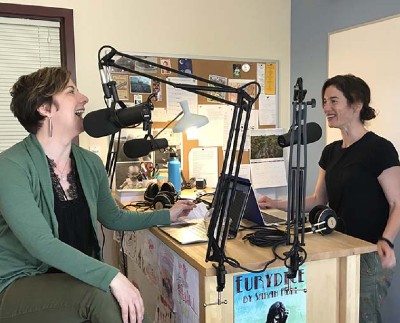The Actor's Mind
Little do we consider the cross over between acting and psychology when watching an actor perform. Yet, the two often intermingle. Anne Penner, associate professor of theatre, and Kateri McRae, associate professor of psychology, explore acting from a psychological perspective in a new podcast, The Actor's Mind.
"We describe and discuss popular acting tools that are commonly used in actor training, rehearsals, and performances," said McRae. "Then we identify the parallel psychological processes that are likely in play when actors use these techniques."
For example, when an actor uses the technique of "substitution," she is drawing from an event, person, relationship, or object in her real life that parallels something in the imaginary circumstances of the play. In the podcast, Penner will share best practices for using and teaching this acting technique, while McRae will explain how Episodic Memory, remembering autobiographical events, is the psychological process in play.
The idea for the podcast came from a faculty lecture in early 2017 in which Penner spoke about modern acting techniques. As a semi-professional actor throughout her adult life, McRae attended the lecture. "My mind was exploding because I could see all sorts of parallels to psychological science," she said.
The two professors met often throughout 2017 to explore ways in which acting technique and psychology intersect.
"We were excited by the energy generated by these conversations," Penner said. "We hit on the podcast medium as a way to share our ideas and honestly express the authentic give and take we were experiencing in discussions." A CAHSS Creative Arts Materials Fund grant has allowed them to purchase sound equipment and compensate their sound engineer and guests.
Season One of The Actor's Mind launched in May, 2018, with Season Two starting in winter, 2019. McRae and Penner discuss the success of acting techniques from their own experience, as well as why they work given the evidence from psychology and neuroscience. Guests are experts from the theatre and science worlds: actors, directors, teachers, and psychological scientists.
"Our main goal is to share the ways in which our scholarship overlaps, and especially to invite listeners into a conversation we are really enjoying and hope they will, too," said Penner. "Another goal for me as an acting teacher is to use the podcast to dive deeper into conversations with my students, and to do so with more specificity."
This summer, during rehearsals at Colorado Shakespeare Festival, Penner's cast mates listened to the podcast and added to the conversation by responding and giving her more ideas and resources. These new ideas will make their way into her teaching, and Season Two, she said.
Penner teaches acting, directing, and movement courses in the department of theatre. She performs throughout the year, most recently with the Colorado Shakespeare Festival, the Boulder Ensemble Theatre Company, and Stories on Stage. She also is a director and producer. Penner will be the faculty speaker at the CAHSS Alumni Reception and Livingston Lecture on May 16, 2019.
In addition to teaching, McRae is the director of the Automaticity, Affect, Control & Thought (AACT) Lab in the department of psychology, where her research focuses on emotion cognition interactions. She uses questionnaires, laboratory tasks, bodily physiology and brain imaging to study how we're able to control, or not control, our emotions.



